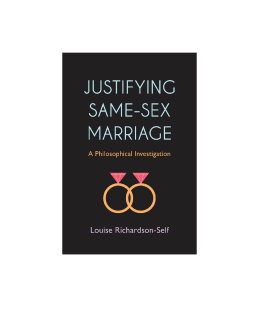
Additional Information
Book Details
Abstract
There is massive public interest in same-sex marriage, a controversial topic that is rarely out of the media. This book investigates the extent to which legalizing same-sex marriage can contribute to ending the discrimination and social stigma faced by lesbian, gay, bisexual, and transgender men and women (LGBT) in the Western world.
This issue breaks down into several further questions: can marriage equality be defended without reinforcing the idea that marriage is the most/only valuable form of intimate relationship? Can marriage equality be defended without further marginalizing non-conforming LGBT people? What kind of equality should LGBT people strive for? What critical agency might they lose when this equality is achieved? What institutional legacies should we embrace? The book focuses on human rights arguments supporting same-sex marriage and questions whether they are likely to both justify legal change and encourage shifts in the sociopolitical reception of LGBT people. After critically analyzing various arguments in favor of same-sex marriage, the author puts forward a justification that allows for marriage equality and does not result in the assimilation of queer identities into heteronormative identity.
As edifying as it is provocative, Justifying Same-Sex Marriage presents a clear and concise philosophical analysis of the arguments for and against same-sex marriage. Richardson-Self considers an impressive range of questions central to the debate with great subtlety, insight, and depth. Her study includes key empirical research as well as a very sophisticated application of rights and justice discourses. She presents a robust and finely chiselled argument in favour of toleration and respect for difference.
Moira Gatens, Challis Professor of Philosophy, University of Sydney.
Louise Richardson-Self’s Justifying Same-Sex Marriage is a compelling reminder that the arguments we make to justify same-sex marriage matter at least as much as the policy reforms those arguments help to achieve.... Richardson-Self’s book is both philosophically rigorous and politically engaged. Scholars interested in the limits and radical potentialities of human rights theories will find much of value here, as will activists engaged in LGBT human rights work around the world.... For readers who object to the assimilationist tenor of the marriage equality movement but recognize the practical benefits it stands to bring about for many queer people, Justifying Same-Sex Marriage will prove an immensely gratifying read. For readers more radically skeptical of the place of marriage equality in a movement for queer liberation, Justifying Same-Sex Marriage is sure to spark continued critical reflection and engagement.
Louise Richardson-Self is a lecturer at the University of Wollongong and a research affiliate at the University of Sydney. She has published articles in Parrhesia, Australian Review of Public Affairs Digest,Australian Feminist Studies and M/C Journal: A Journal of Media and Culture.
Does the ability of marriage equality to end discrimination against LGBTs not depend upon what the arguments for marriage equality are? Moving nimbly through legal developments, ethical theory and social philosophy, Richardson-Self cautions us that if those arguments depend upon the unique value of marriage as a form of intimate relationship they will only further marginalize LGBT people whose relationships do not conform to heterosexual norms. This is a carefully argued book and an important voice in the current discussion.
Georgia Warnke, Professor of Political Science, University of California, Riverside
Justifying Same-Sex Marriage leads the reader along a politically engaged and analytically rigorous path and in doing so, directs the debate concerning same-sex marriage in such a way that the author’s voice has already significantly changed that debate from within. As such the book reads like a whodunit in its tenacious unfolding and deconstruction of the various pros and cons articulated, not only in feminist theories and queer theories, but also in legal theories and human rights discourses and their concomitant ideological and normalizing (i.e. hetero-centric) undercurrents. Richardson-Self eloquently claims that equal rights are certainly not the end of discrimination and stigmatization, but an indispensable step in processes of symbolic and global justice.
Rosemarie Buikema, Chair Graduate Gender Programme, University of Utrecht
Richardson-Self’s original approach focuses on our potential for differing, and fostering a diversity of relationships. Using a range of studies from Australia, the Netherlands, the US and elsewhere, the work develops a conceptual and legal basis for defending ‘the impossible’, and imagining a different future. It is a timely and significant work on an issue that should be of concern to us all.
Marguerite La Caze, Associate Professor of Philosophy, University of Queensland.
